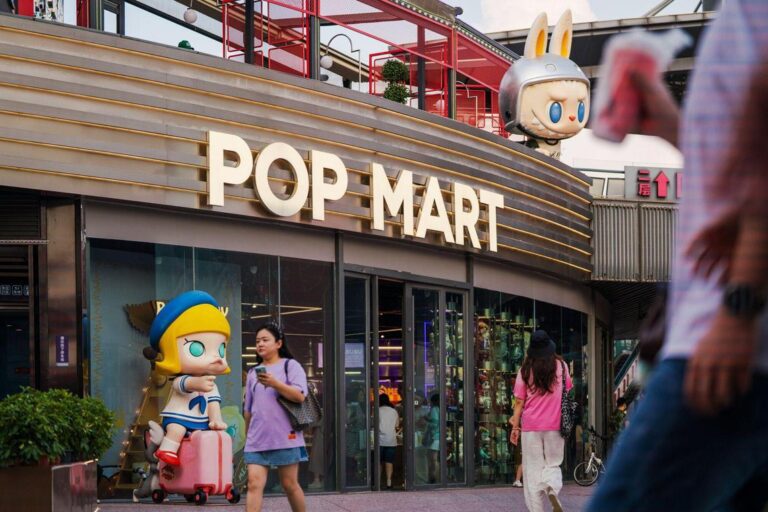BEIJING – The new mini Labubus unveiled by Chinese toymaker Pop Mart International Group sold out almost instantly at home and in major overseas markets, an indication of the still-strong demand for the rabbit-eared plush dolls.
The toys sold out within minutes after their release in Pop Mart’s key markets, including the United States, Japan and South Korea, when pre-sale began at around 10am on Aug 29.
In China, all available inventory was taken almost immediately after sales opened online at 10pm on Aug 28, with the traffic causing Pop Mart’s WeChat store page to freeze.
“The popularity of the new series has already demonstrated that consumers’ enthusiasm for Labubu remains strong,” said Mr Richard Lin, an analyst with SPDB International Holdings.
Pop Mart’s shares witnessed choppy trading on Aug 29, swinging from gains of 2.2 per cent at one point to losses of 2 per cent at another.
“The market has already priced in the popularity of the mini Labubu and the stock prices have priced in the great demand,” said Mr Lin.
Pop Mart shares had risen to a record after the company’s founder and chief executive officer Wang Ning announced the new line of Labubu dolls last week.
Collectors as well as resellers tried to get their hands on the new release. Ms Wang Xiaolei, a 26-year-old Beijing programmer and part-time Labubu reseller, scored one 14-box set of the new mini Labubu dolls on Pop Mart’s WeChat store, but was unable to buy more before they sold out.
“I’m going to sell the whole package. I’m not keeping the Labubus for myself,” said Ms Wang, who has made more than US$7,000 (S$9,000) buying and reselling Labubus and other Pop Mart toys over the past year.
The 28 standard-edition mini Labubus, which stand about 10.5cm tall and come in a variety of colours, were priced at 79 yuan (S$14) apiece in China. Pop Mart said there is a one-in-168 chance of pulling one of two special-edition dolls from the unmarked boxes.
The company also began sales of a larger, more premium version of the doll priced at 499 yuan and a Labubu-themed pendant.
Pop Mart has been riding a wave of demand for the plush dolls, posting soaring and stronger-than-expected first-half earnings earlier in August.
Its stock has rallied 262 per cent in 2025, taking its total market value to HK$435.7 billion (S$71.7 billion) and making Mr Wang one of China’s youngest billionaires.
The mania over Labubu dolls is reminiscent of the Beanie Baby craze in the US two decades ago. Resale prices of those colourful beanbag toys soared in the late 1990s – exacerbated by manufacturer Ty’s policy of retiring some versions – before the collecting fad ended and demand collapsed.
Mr Wang, speaking in a recent interview with Chinese state media, explained the slow and staggered release of Labubu dolls as a function of their hand-sewn complexity that limits production speed.
Days before the official launch, resellers on second-hand trading platforms, including Alibaba Group Holding’s Xianyu, already offered pre-sales for the new mini Labubu products at a premium over the retail price. One reseller priced a full case of 14 mini Labubus at 2,600 yuan, promising expedited delivery on Aug 29. This is more than double the official retail price of 1,106 yuan for a 14-box set.
Ms Wang the reseller said she planned to sell her set for about 1,700 yuan, netting a profit of around 600 yuan.
Demand is running so high that fake mini Labubus have started to appear, according to a statement from China’s General Administration of Customs, which recently seized hundreds of knock-offs.
Many of Pop Mart’s toys are priced higher in Western markets than they are at home in China. The mini Labubu that goes on sale this week will be offered at US$22.99 in the US, according to Pop Mart’s American website, about double the price in China.
Pop Mart has carved out a dominant niche in the designer toy market through its blind-box model, which amplifies the thrill as buyers do not know which character they will get. Influencer shout-outs and celebrity sightings, from Blackpink’s Lisa to David Beckham, have further boosted demand. BLOOMBERG


